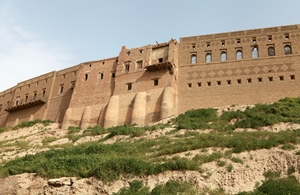To increase security and provide increased reconnaissance concerning groups of Islamic extremists in the region, U.S. forces have raised the number of drone surveillance flights over Iraq, according to an article published by Military.com.
President Barack Obama has authorized the buildup of 775 U.S. troops in Iraq, of which roughly 640 servicemembers have arrived in the region. Instead of relying on ground forces, however, Rear Adm. John Kirby, the Pentagon press secretary, told reporters at a Pentagon briefing that armed and unarmed drones would be flown over Iraq.
Increased security measures
"We continue to fly both manned and unmanned aircraft over Iraq at the Iraqi government's request predominantly for reconnaissance purposes," Kirby said.
Although most of the drones are unarmed, some have been equipped with Hellfire missiles to protect the U.S. embassy and the airport in Baghdad, according to Military.com. Additionally, Kirby told reporters the armed drones were being used for increased security for other reasons.
"The reason that some of those aircrafts are armed is primarily for force protection reasons now that we have introduced into the country some military advisors whose objective will be to operate outside the confines of the embassy," Kirby said.
According to Military.com, the number of unmanned drone flights over Iraq has increased from roughly 35 per day to gain intelligence about the developing threats presented by Islamic State of Iraq and the Levant forces to 50 flights per day. Additionally, the 775 troops sent to the area have been charged with providing increased security at the U.S. embassy, installing Joint Operation Centers in Baghdad and advising Iraq's security forces. They are not meant to serve in ground combat.
"We're taking a very measured, deliberate approach," Kirby said.
A build up of troops, but no plans to deploy
The 775 soldiers are a tiny portion of the 31,000 troops and sailors within the area, according to Military.com. U.S. forces have deployed aircraft carriers, cruisers, destroyers and several other commissioned vessels into the area, yet there is no assault plan ready unless U.S. territory is threatened.
According to a report by The Associated Press, Gen. Martin Dempsey, the chairman of the Joint Chiefs of Staff has said that no assault against Iraqi insurgents will be made unless those forces become a threat to the American homeland.
Instead, Dempsey said that he does not believe a strong U.S. military force is necessary to bolster Iraqi forces in battling the ISIL insurgency. The general conceded that U.S. military action could be a future possibility, but encouraged a higher focus on political reform within the country instead.
"I think the situation demands first and foremost that the Iraqi political system find a way to separate the Sunnis who have partnered now with ISIL, because they have zero confidence in the ability of Iraq's politicians to govern," Dempsey told reporters, according to the AP.

